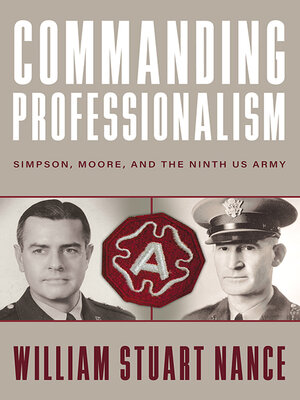Commanding Professionalism
ebook ∣ Simpson, Moore, and the Ninth US Army · American Warriors Series
By William Stuart Nance

Sign up to save your library
With an OverDrive account, you can save your favorite libraries for at-a-glance information about availability. Find out more about OverDrive accounts.
Find this title in Libby, the library reading app by OverDrive.



Search for a digital library with this title
Title found at these libraries:
| Library Name | Distance |
|---|---|
| Loading... |
When one thinks of influential World War II military figures, five-star generals such as Dwight D. Eisenhower and Omar Bradley instantly come to mind. As important as these central figures were to the Second World War, the conflict produced equally effective lower-profile leaders whose influence had an undeniable impact.
Among these leaders are William Simpson, commander of the US Ninth Army, and James Moore, his chief of staff. Working in tandem, the pair helmed a unit that gained recognition as "uncommonly normal," an affectionate designation driven by their steadfast professionalism in all endeavors. It was their unobtrusive leadership style that relegated these career military men to the footnotes of military history.
Commanding Professionalism: Simpson, Moore, and the Ninth US Army corrects this historical oversight by examining the achievements of these overlooked heroes. Focusing on Simpson and Moore's careers from 1940 through the end of World War II, author William Stuart Nance recounts the pair's working relationship. Together, they successfully maneuvered through the squabbling of the American and British forces and developed an army admired for its consistency of conduct and military prowess, capable of resisting the complex external and political machinations of the time.
Simpson and Moore's unflinching devotion to the greater good and their steady handle on the dynamics of command/staff relationships proved essential to the war effort and its ultimate success. Their example, Nance argues, remains aspirational and worthy of emulation in the military command structure of today.







